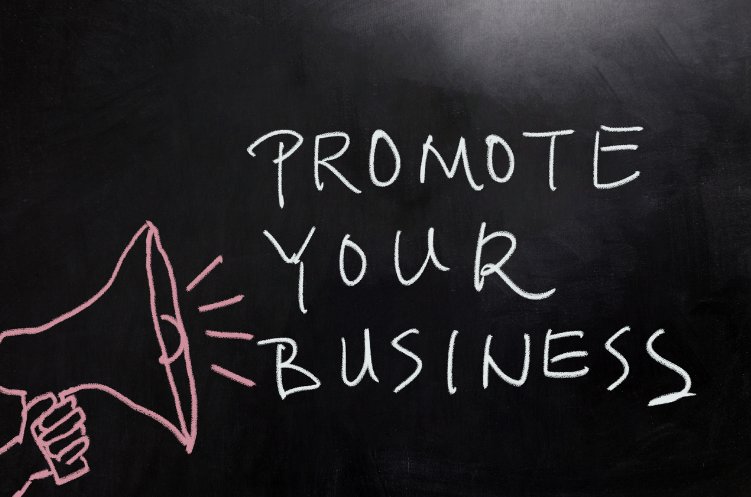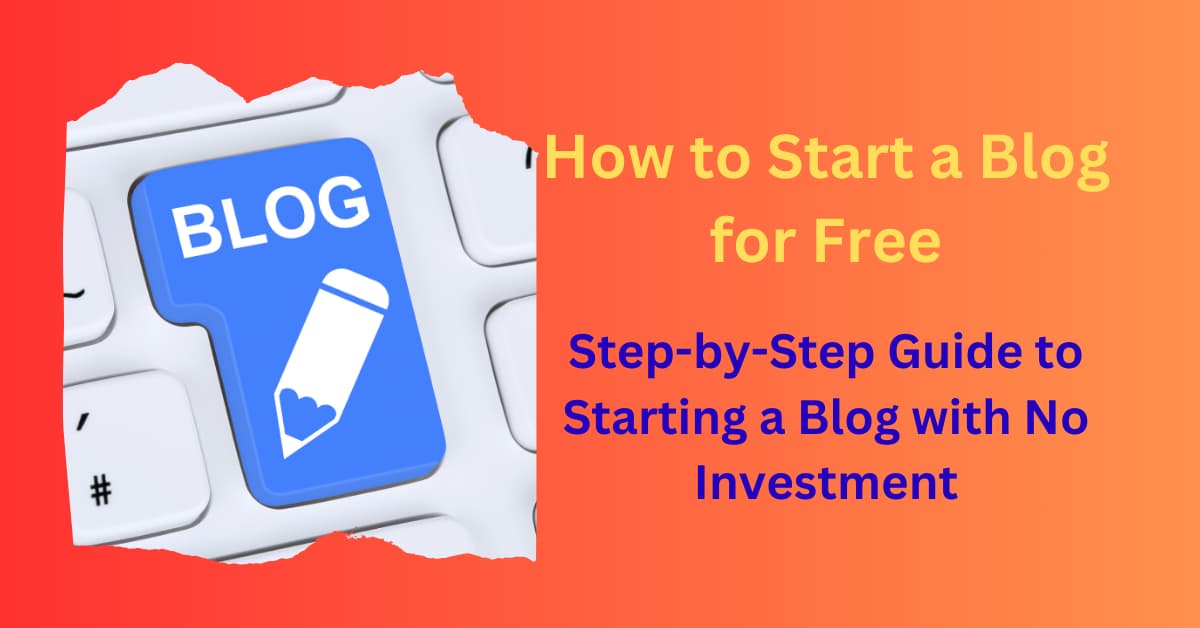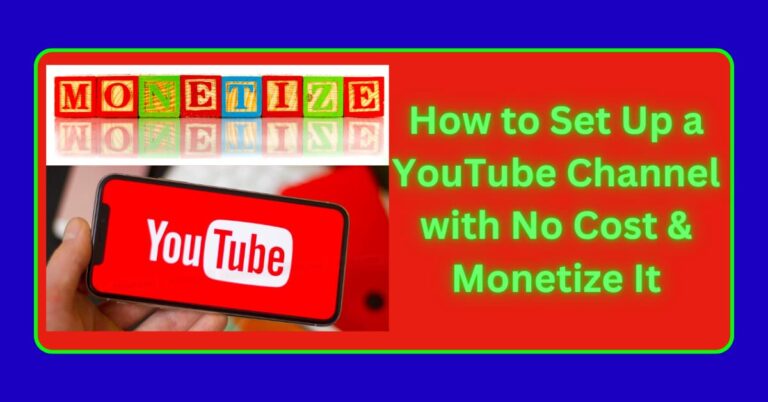How to Start a Blog for Free | Step-by-Step Guide to Starting a Blog with No Investment
Introduction
Hey there! Are you fed up with the daily grind and desperate to escape the 9 to 5 trap? I was right where you are now, dreaming of a life where I could work on my own terms, achieve financial freedom, and have more time for the things I love. Guess what? Starting a blog was my golden ticket to that dream life, and it can be yours too! Join me as I reveal the secrets to starting a blog with zero upfront investment and transforming your life just like I did. Get ready to break free and chase your dreams!
Understanding the Blogging Landscape
The Potential of Blogging
When I first heard about blogging, I thought it was just a hobby for writers. But then I stumbled upon stories of people who turned their blogs into thriving businesses. Take Pat Flynn, for example. He started his blog, Smart Passive Income, to share his experiences with passive income and now makes a six-figure income from it. These success stories showed me that blogging could be a legitimate path to financial and time freedom.

Niches and Topics
Choosing the right niche is crucial. I spent weeks brainstorming topics that I was passionate about and that had market demand. Ultimately, I settled on personal finance and productivity because I loved helping people manage their money and time better. Think about what you’re passionate about and what problems you can solve for your readers.
Types of Blogs
There are different types of blogs you can start:
- Personal Blogs: Share your personal experiences and stories.
- Professional Blogs: Showcase your expertise in a specific field.
- Business Blogs: Promote your business and engage with customers.
I started with a personal blog, sharing my journey to financial independence. Over time, it evolved into a professional blog where I offer advice and resources to help others do the same.
Planning Your Blog
Defining Your Purpose
Before you start your blog, it’s essential to define your purpose. For me, it was about sharing my journey and helping others achieve financial freedom. Your purpose might be different, but it’s important to have a clear vision of what you want to achieve.
Target Audience
Understanding your target audience is key. My readers are mostly people in their 20s to 50s who are tired of the 9 to 5 grind and looking for ways to achieve financial and time freedom. Think about who you want to reach with your blog and what their needs and interests are.
Content Strategy
Planning your content is crucial. I created a content calendar to ensure I had a steady stream of blog posts. Start with topics you’re passionate about and that your audience will find valuable. Over time, you’ll get a better sense of what resonates with your readers.
Choosing a Blogging Platform

Free Platforms
There are several free blogging platforms to choose from. I started with WordPress.com because it’s user-friendly and offers a lot of customization options. Other popular options include Blogger and Medium. You can also start your own blog on the FREE-For-Life platform Systeme.io. Each platform has its pros and cons, so choose one that suits your needs.
Pros and Cons
- WordPress.com: Great for customization but has limited monetization options on the free plan.
- Blogger: Easy to use but lacks advanced features.
- Medium: Excellent for reach but offers limited control over your content.
- Systeme.io: Free for life. Complete control over ALL your content and also has the comprehensive tools to monetize your blog.
I recommend starting with WordPress.com because it’s easy to use and you can always upgrade to a self-hosted WordPress site later.
Getting Started
Setting up your blog on a free platform is straightforward. Here’s a step-by-step guide for WordPress.com:
- Sign Up: Go to Systeme.io or WordPress.com and sign up for a free account.
- Choose a Domain: Pick a free domain name (e.g., yourblog.wordpress.com) or add your own to Systeme.io.
- Select a Theme: Choose a free theme that matches your blog’s style.
- Customize: Customize your theme, add widgets, and set up your blog’s layout.
Setting Up Your Blog
Creating an Account
Creating an account on your chosen platform is simple. Just follow the instructions and you’ll be up and running in no time.
Choosing a Domain Name
Your domain name is your blog’s address on the web. It should be memorable and relevant to your niche. When I started, I chose a name that reflected my passion for financial independence. Spend some time brainstorming and checking the availability of your chosen name.
Selecting a Theme
Your blog’s theme determines its look and feel. Systeme.io and WordPress.com offer a variety of free themes that you can customize to match your brand. I spent hours tweaking my theme to get it just right, but it was worth it.
Essential Plugins and Tools
Plugins are like apps for your blog. They add functionality and improve the user experience. Some must-have plugins for WordPress include:
- RankMath SEO: Helps optimize your posts for search engines.
- Jetpack: Provides security, performance, and marketing tools.
- Google Analytics: Tracks your blog’s traffic and performance.
You DO NOT need any plugins in Systeme.io. Everything you need is already built into the platform.

Creating and Publishing Content
Content Creation Basics
Writing your first blog post can be intimidating, but don’t overthink it. Start by introducing yourself and explaining why you started the blog. Share your story and what readers can expect from your content.
Content Calendar
A content calendar helps you plan and schedule your posts. I use Google Calendar to keep track of my blog topics and deadlines. Aim to publish consistently, whether it’s once a week or once a month.
SEO Basics
Search Engine Optimization (SEO) is crucial for getting your blog noticed. Use keywords related to your niche, write engaging headlines, and include internal and external links. RankMath SEO is a great tool for optimizing your posts.
Visual Content
Visuals make your blog more engaging. Use free resources like Pexels.com for high-quality images and Canva for creating graphics. Adding images, videos, and infographics can help illustrate your points and keep readers interested.
Promoting Your Blog

Social Media Marketing
Social media is a powerful tool for driving traffic to your blog. Create profiles on platforms where your target audience hangs out. I started with Facebook, Twitter, and Instagram, sharing my posts and engaging with followers.
Guest Posting
Guest posting on other blogs can increase your exposure and drive traffic to your site. Reach out to bloggers in your niche and offer to write a guest post. Make sure to include a link back to your blog.
Networking
Joining blogging communities and forums can help you connect with other bloggers and potential readers. I joined several Facebook groups for bloggers, where I shared my posts and learned from others.
Email Marketing
Building an email list is essential for staying in touch with your readers. I use Systeme.io to collect email addresses and send newsletters. Offer a freebie, like an ebook or checklist, to encourage people to subscribe.
Monetizing Your Blog
Affiliate Marketing
Affiliate marketing involves promoting products and earning a commission for every sale made through your referral link. I signed up for affiliate programs related to my niche and included affiliate links in my posts. It took some time to see results, but it eventually became a steady source of income.
To learn more about what affiliate marketing is and where to begin, click this link.
Sponsored Posts
Once your blog gains traction, brands may approach you for sponsored posts. These are paid posts where you promote a product or service. Be transparent with your readers and only promote products you believe in.
Advertising
Using ad networks like Google AdSense can generate income through ads displayed on your blog. The earnings might be small initially, but they can add up over time as your traffic grows.
Digital Products
Creating and selling digital products, like ebooks, courses, and printables, can be highly profitable. I wrote an ebook on financial independence and offered it for sale on my blog. It took some effort to create, but the passive income it generates is worth it.

Staying Consistent and Motivated
Setting Goals
Setting short-term and long-term goals keeps you focused and motivated. My short-term goal was to publish one post per week, while my long-term goal was to turn my blog into a full-time income source.
Time Management
Balancing blogging with other responsibilities can be challenging. I found it helpful to set aside specific times for writing, promoting, and engaging with readers. Stick to a schedule and make blogging a priority.
Dealing with Challenges
Blogging comes with its share of challenges, from writer’s block to technical issues. Stay patient and persistent. Reach out to other bloggers for support and advice. Remember, every successful blogger faced challenges along the way.
Continuous Learning
The blogging world is constantly evolving. Stay updated with the latest trends and techniques by reading blogs, taking online courses, and attending webinars. Investing in your knowledge will pay off in the long run.
Conclusion
Starting a blog for free is a journey that requires dedication and patience, but the rewards are worth it. Remember, it’s not an overnight success story. It took me months of consistent effort to see significant results, but I can confidently say that blogging changed my life. It gave me the financial and time freedom I always dreamed of. So, take that first step, start your blog today, and share your journey with the world.
Additional Resources
Free Tools and Resources
- Canva: For creating graphics and visuals.
- Pexels: For high-quality free images.
- Grammarly: For grammar and spelling checks.
- Google Analytics: For tracking your blog’s performance.
- Hemingway Editor: For improving your writing clarity.
Community Support
- Facebook Groups: Join blogging groups to connect with other bloggers.
- Reddit: Participate in subreddits related to blogging.
- Blogging Forums: Engage in forums to share tips and advice.
Further Reading
– “The Millionaire Blogger” by Pat Flynn: Inspiring success stories and blogging tips.
- “ProBlogger: Secrets for Blogging Your Way to a Six-Figure Income” by Darren Rowse and Chris Garrett: Comprehensive guide to professional blogging.
- “Blogging for Dummies” by Amy Lupold Bair and Susannah Gardner: Beginner-friendly blogging guide.
FAQ
1. How long does it take to start making money from a blog?
It varies. Some bloggers see income within a few months, while for others, it might take a year or more. Consistency, quality content, and effective promotion are key factors.
2. Can I really start a blog with no investment?
Yes! Using free platforms like WordPress.com and leveraging free resources, you can start without any upfront costs. As your blog grows, you may choose to invest in premium tools and services.
3. How often should I publish new content?
Aim for consistency. Whether it’s once a week or once a month, stick to a schedule that works for you. Quality is more important than quantity.
4. What if I run out of blog post ideas?
Engage with your audience to understand their needs and questions. Use tools like Google Trends and AnswerThePublic to find trending topics. Repurpose old content or collaborate with other bloggers for fresh perspectives.
5. Is it necessary to be an expert in my niche to start a blog?
No, you don’t need to be an expert. Share your journey, experiences, and what you learn along the way. Authenticity and a willingness to help others are more important than expertise.
Starting a blog is an exciting journey that can lead to incredible opportunities. Stay committed, keep learning, and enjoy the process. Happy blogging!






I was recommended this website by my cousin I am not sure whether this post is written by him as nobody else know such detailed about my difficulty You are wonderful Thanks
Thank you very much. if you have any specific questions, please do not hesitate to ask.
Real Estate You’re so awesome! I don’t believe I have read a single thing like that before. So great to find someone with some original thoughts on this topic. Really.. thank you for starting this up. This website is something that is needed on the internet, someone with a little originality!
Hey, Jack here. I’m hooked on your website’s content – it’s informative, engaging, and always up-to-date. Thanks for setting the bar high!